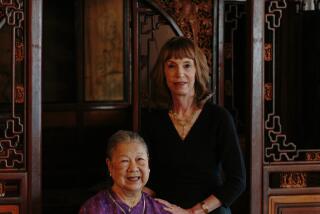Mary Wesley, 90; First Novel, at 70, Set Sexual Tone for String of Bestsellers
- Share via
LONDON — Mary Wesley, who published her first novel when she was 70 and went on to produce a string of slightly racy bestsellers, has died. She was 90.
Wesley, whose examinations of middle-class values have been described as “like Jane Austen with sex,” died Dec. 30 at her home in Totnes, England, the local rector, Nicholas Martin, announced.
Wesley had been suffering from gout and a blood disorder in recent months, The Times, The Independent and other newspapers reported this week.
The author of “The Camomile Lawn” and “A Sensible Life” was most famous for her late start in a literary career and for the enthusiastic sexuality of her characters.
“I’ve been told that I give the blue-rinse brigade quite a shock,” she once said. “People are startled by my books, because they think, ‘How can an old woman write about sex?’ As though one could forget it.”
Wesley told interviewer Angela Lambert in 1994, “The idea that people go on being sexy all their lives is little explored in fiction.”
A former baroness and a cousin of the Duke of Wellington, Wesley drew many of her characters from the upper reaches of British society and frequently set her tales during World War II.
“The Camomile Lawn” -- with plenty of sex and plenty of wartime frivolity -- was made into a television series.
“People did enjoy the war,” she told The Independent in 1994. “People of my generation had a very good time. It was an atmosphere of terror and exhilaration and parties, parties, parties. People did things they wouldn’t have done otherwise and were frivolous as well as desperate.”
Born in Englefield Green, England, Wesley was the daughter of an army colonel. She later recalled that she was barely educated as a child because “my parents didn’t think it necessary to educate girls.... I was totally ignorant.” She was married to Baron Swinfen by the time the war broke out.
She worked in intelligence, had two sons and saw her marriage break up before the war was over. She had also educated herself and met journalist Eric Siepmann, the man she was to love from their meeting in 1944 until his death in 1970.
They were not able to marry until 1952 because his wife couldn’t be located to divorce. So the unconventional baroness changed her name legally to Siepmann and moved in with him.
Her family was outraged and unpleasant, Wesley said, and she had little to do with them for the rest of her life.
When her husband died in 1970 of Parkinson’s disease, their son, Bill, was 16 and still at school.
“I had no money except for my widow’s pension and 50 pounds a month from some family trust, and no qualifications for work,” she told The Independent. “I was very, very broke for a long time. I was desperate, counting the pennies and thinking, ‘Can I afford a stamp or must this letter wait till Monday?’ ”
She had written a couple of children’s books before her husband’s death, but it was not until 1983, when she was 70, that she sold her first novel, “Jumping the Queue,” a bleakly humorous story of incest, suicide and middle-aged sex.
From then on, she wrote nearly a novel a year. Her books began moving straight onto the bestseller list as readers grew to expect spare, well-crafted prose and a mixture of racy gentility, humor and unconventionality.
More to Read
Sign up for our Book Club newsletter
Get the latest news, events and more from the Los Angeles Times Book Club, and help us get L.A. reading and talking.
You may occasionally receive promotional content from the Los Angeles Times.





